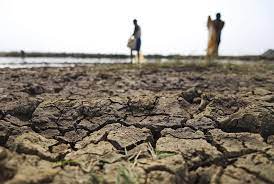WaterAid Canvasses Urgent Intervention On Africa’s Water Crisis
Featured, Latest Headlines, News Across Nigeria Wednesday, September 29th, 2021
(AFRICAN EXAMINER) – Ahead of the forthcoming United Nations Climate Change Conference of Parties (COPs), an international not-for-profit organization, WaterAid has harped on the need for urgent action to ensure that water is prioritized in the agenda of Africa’s climate policies and programmes.
This year’s edition of the event, tagged “COP26”, which is holding in the city of Glasgow, Scotland under the presidency of the United Kingdom (UK), will once again, bring together representatives of almost every country on earth in November for twelve days of talks on climate change.
WaterAid is currently working in 28 countries to change the lives of the poorest and most marginalised people by making clean water, decent toilets and good hygiene normal for everyone, everywhere within a generation. Since 1981, the organization has reached 27 million people with clean water and 27 million people with decent toilets.
In a statement to mark the on-going Africa Climate Week, being hosted virtually by Uganda and UN partners, as African countries prepare their positions in advance of the COP26 climate summit in the UK, WaterAid said climate change threatens critical water supplies for Africa’s most vulnerable people.
This, according to the statement, is the central theme WaterAid regional programmes in Africa want to ensure that delegates to Africa Climate Week 2021 incorporate in their demands to world leaders meeting at COP26.
Notably, Africa Climate Week is expected to build momentum towards ambitious political action. The leadup to COP26 is also an opportunity for African countries, including Nigeria, as they prepare their Nationally Determined Contributions (NDCs). These are national climate plans which need to include commitments for climate-resilient water, sanitation and hygiene services.
The statement pointed out that Africa is the most-exposed region to the adverse effects of climate change despite contributing the least to global warming, adding that the entire continent accounts for less than 4 percent of the total global carbon emission but is home to 33 of the top 50 countries most vulnerable to climate change.
It further noted that this year’s Intergovernmental Panel on Climate Cange (IPCC) report shows a clear link between climate change and water. “It makes a stark warning that urgent action is needed to tackle the dangerous effects of climate change, which is most felt through access to water: flooding, drought, unpredictable weather patterns and salination from rising seas”, the statement added.
The statement stressed that by 2025 Niger’s annual water needs will exceed the available water resources and by 2050 water volumes are expected to fall significantly across Burkina Faso, adding that the UN declared that Madagascar is on the brink of experiencing the world’s first climate change famine in the south of the island nation.
“The fluctuations in the levels of Malawi’s 2nd largest body of water, Lake Chilwa, have become ever more extreme affecting the lives of 1.5 million who live in that densely populated basin region. ”, the statement further disclosed.
“In addition to the challenges of coping with the effects of extreme weather events, almost 1 in 3 Africans live without clean water close to their homes. The continent still depends on surface water for drinking, washing and cleaning. But these sources of water are unreliable and easily contaminated. These issues, combined with rising temperatures, can facilitate the spread of waterborne diseases such as cholera across Africa”, the statement further disclosed.
Similarly, in Nigeria, Africa’s most populous nation, 60 million people lack clean water close to home, depending almost entirely on groundwater for domestic water supply, especially in rural areas. Groundwater provides much-needed protection against the impacts of climate change, acting as a buffer to changing water availability and quality in many parts of the world.
“Nigeria ranks 55th most vulnerable country to climate change – among the top 35% in the world – but only receives USD $1 per person, per year in climate finance. This is for both mitigation – cutting carbon emissions – and adaptation – reducing the impacts of climate change”, the statement stressed.
WaterAid’s Regional Director for East Africa Olutayo Bankole-Bolawole said Africa needs urgent action to make sure that the most vulnerable in Africa can cope in the face of climate change,
“Given the undeniable links between climate change and water, this means that everyone must have a reliable and sustainable source of clean water and access to a toilet that is clean, safe and climate-resilient
“This level of funding is a completely inadequate response to the growing crisis and to the critical need to begin adaptation initiatives now to build resilience for the future”, she said.
Bankole-Bolawole noted that the Africa Climate Week is a major opportunity to highlight to national governments, regional donors and institutions the value that climate-resilient WASH brings to climate change adaptation for national action, and to advocate for the funding needed to make climate adaptation sustainable and resilient.
“We are calling for all governments to urgently address the effects of the climate crisis and ensure sustainable access to clean water is a fundamental part of their national strategies for both adapting to and mitigating the effects of climate change”, she added.
Similarly, Country Director of WaterAid Nigeria, Evelyn Mere, observed that climate change has intensified both the sanitation and water crisis, adding that the climate clock is ticking and if efforts are not made to better understand, value and protect this vital resource, making it a central feature of climate change adaptation strategies, humanity will face a very bleak future.
“The government must respond now to the urgent threat of climate change and recognise the vital role climate-resilient water and sanitation services and systems play in helping vulnerable communities be more prepared for climate change; because despite contributing the least to it, it’s the world’s poorest people currently suffering the brunt of its destructive impact
“Far too little is spent on helping the most vulnerable people adapt to the impacts of climate change which is putting the health and lives of millions at risk. Climate change affects the occurrence of infectious diseases. Climatic conditions affect epidemic diseases, shifting the burden of diseases and increasing health risks for the populace. It is therefore crucial that we tackle climate change so as to mitigate these health risks as well”, she further explained.
Related Posts
Short URL: https://www.africanexaminer.com/?p=68562




















